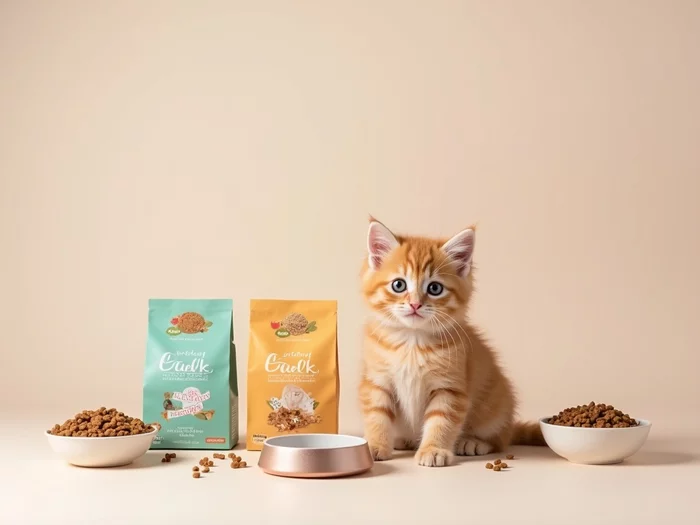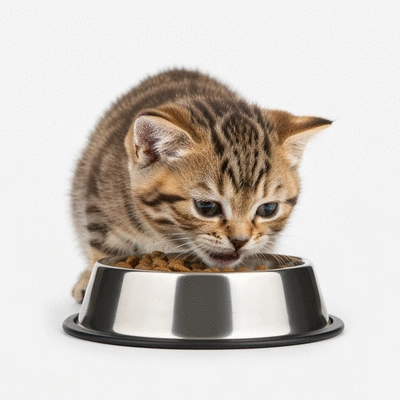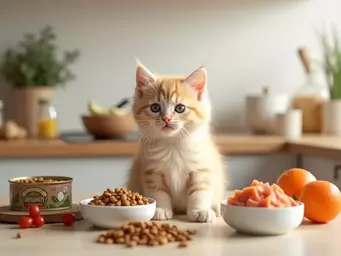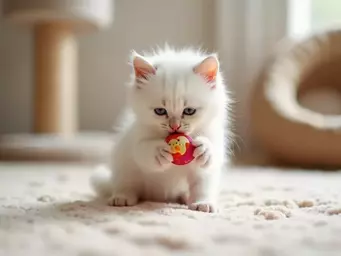Key Nutritional Elements
- 1Protein: At least 30% for rapid growth and energy.
- 2Fat: Essential for energy and vitamin absorption.
- 3Vitamins (A, D, E, B): Support various bodily functions.
- 4Minerals (Calcium, Phosphorus): Vital for bone development.
Ready to be the best kitten parent ever? Get expert tips, product reviews, and essential guides delivered straight to your inbox!
Posted on: 2025-10-11
By: Edyta Drabek
The journey of becoming a kitten parent comes with a myriad of responsibilities, especially when it comes to nutrition. To set your furry friend up for a happy and healthy life, understanding the essentials of kitten nutrition is crucial. With a focus on quality ingredients and balanced diets, you can ensure your kitten thrives.
A concise guide to essential nutrients and safety considerations for your kitten's diet.
Taurine is a crucial amino acid for kittens' development. Their bodies cannot produce enough of it naturally, making dietary inclusion essential.
Prioritize your kitten's health by staying informed about food safety standards and brand practices.
As a first-time kitten parent, you might be asking yourself: "What do I really need to know about kitten nutrition?" Understanding the essentials of kitten nutrition is the foundation for a happy, healthy life for your furry friend! In 2025, the focus is on quality ingredients that cater to the specific needs of growing kittens. Let's dive into what you should prioritize in your little one's diet.
Protein is the powerhouse of your kitten's diet! Kittens need plenty of it for their rapid growth, energy, and overall development. At Kittie Care Central, we recommend looking for kitten foods that contain at least 30% protein. But it's not just about protein; other key nutrients like fats, vitamins, and minerals play crucial roles as well.
When choosing your kitten's food, aim for a balanced formula that provides these crucial nutrients to set the stage for a vibrant, active life! For detailed guidance on kitten nutrition, explore the AAHA-AAFP Feline Life Stage Guidelines on Nutrition and Weight for Kittens.
Reading ingredient labels can feel overwhelming, but knowing what to look for simplifies the process! Seek out high-quality, recognizable ingredients that contribute positively to your kitten’s well-being. Here’s a quick guide:
Using this guide will help you navigate the myriad of options on store shelves. After all, what’s in the food matters as much as the nutrition it provides! Further information on ensuring proper nutrition for your cat is available from the Merck Veterinary Manual.
Taurine is a superhero nutrient for kittens! This amino acid is essential for heart health, vision, and overall development. Your kitten's body cannot produce enough taurine on its own, so it must be included in their diet. Most reputable kitten foods will have taurine listed as an important ingredient, but it's always good to check!
By ensuring your kitten's food contains adequate levels of taurine, you’re investing in their long-term health and happiness. Remember, a well-fed kitten is a happy kitten! You can find more comprehensive details on kitten nutrition and developmental needs at VCA Hospitals Pediatric Kitten Nutrition resources.
Choosing the best kitten food brand can feel like a daunting task. With so many options available, how do you know which ones are worth trying? Don’t worry! Here’s a quick comparison to help you find the right choice.
As you navigate the world of kitten nutrition, we want to hear from you! What's your top priority when choosing food for your kitten? Select one option below:
A1: Kittens require at least 30% protein in their diet to support their rapid growth and energy needs.
A2: Look for real meat (like chicken or fish), whole grains, and vegetables. Avoid fillers such as corn, soy, wheat, artificial additives (preservatives, colors), and undefined meat by-products.
A3: Taurine is a crucial amino acid for kittens because their bodies cannot produce enough of it naturally. It's essential for heart health, vision, and overall development.
A4: Regularly check for food recalls from reputable sources like the FDA or AVMA, read ingredient labels carefully, look for brands with transparent sourcing and manufacturing practices, and ensure the food complies with AAFCO and FDA guidelines.
A5: AAFCO (Association of American Feed Control Officials) sets standards for pet food labeling, defining nutritional adequacy. The FDA (Food and Drug Administration) oversees the safety of ingredients in pet food. Understanding these guidelines helps you make informed choices about your kitten's diet, ensuring it meets safety and nutritional standards.
As a first-time kitten parent, one of your top priorities should be ensuring that the food you choose for your new furry friend is both safe and of high quality. With the abundance of brands and products on the market, it’s essential to understand how to navigate this landscape. I often remind fellow cat parents that knowledge is power when it comes to kitten nutrition!
Here are a few key areas to focus on when evaluating your kitten's food:
By keeping these factors in mind, you can help ensure a healthy start for your kitten!
Staying updated on pet food recalls is vital to ensuring your kitten's safety. I recommend signing up for alerts from sources like the FDA or the American Veterinary Medical Association. They provide timely information on any potential health risks associated with specific products. Additionally, always read labels carefully! Look for any red flags in the ingredient list, such as questionable fillers or artificial additives.
By doing this, you'll feel more confident about the food you're providing to your kitten!
When choosing kitten food, it’s important to look for brands that are transparent about their ingredients and sourcing practices. Brands that openly share their manufacturing processes and ingredient origins tend to prioritize quality. As a kitten caregiver, I always look for companies that practice ethical sourcing and are transparent about their nutritional claims.
Trust builds a sense of security, not just for you, but also for your little furball!
Understanding the regulations surrounding pet food can be overwhelming, but it’s crucial for every kitten parent. The Association of American Feed Control Officials (AAFCO) sets the standards for pet food labeling, while the FDA oversees the safety of the ingredients used. Familiarizing yourself with these organizations can help you make informed choices regarding your kitten’s diet.
By understanding these guidelines, you’ll be better equipped to select the safest food options for your kitten!
Here is a quick recap of the important points discussed in the article:



 As you embark on the journey of kitten parenting, understanding your little furball's nutritional ne
As you embark on the journey of kitten parenting, understanding your little furball's nutritional ne
 As you embark on the rewarding journey of kitten parenthood, understanding the significance of choos
As you embark on the rewarding journey of kitten parenthood, understanding the significance of choos
 Early training is not just a phase; it's a cornerstone of a kitten's lifelong behavior and well-bein
Early training is not just a phase; it's a cornerstone of a kitten's lifelong behavior and well-bein